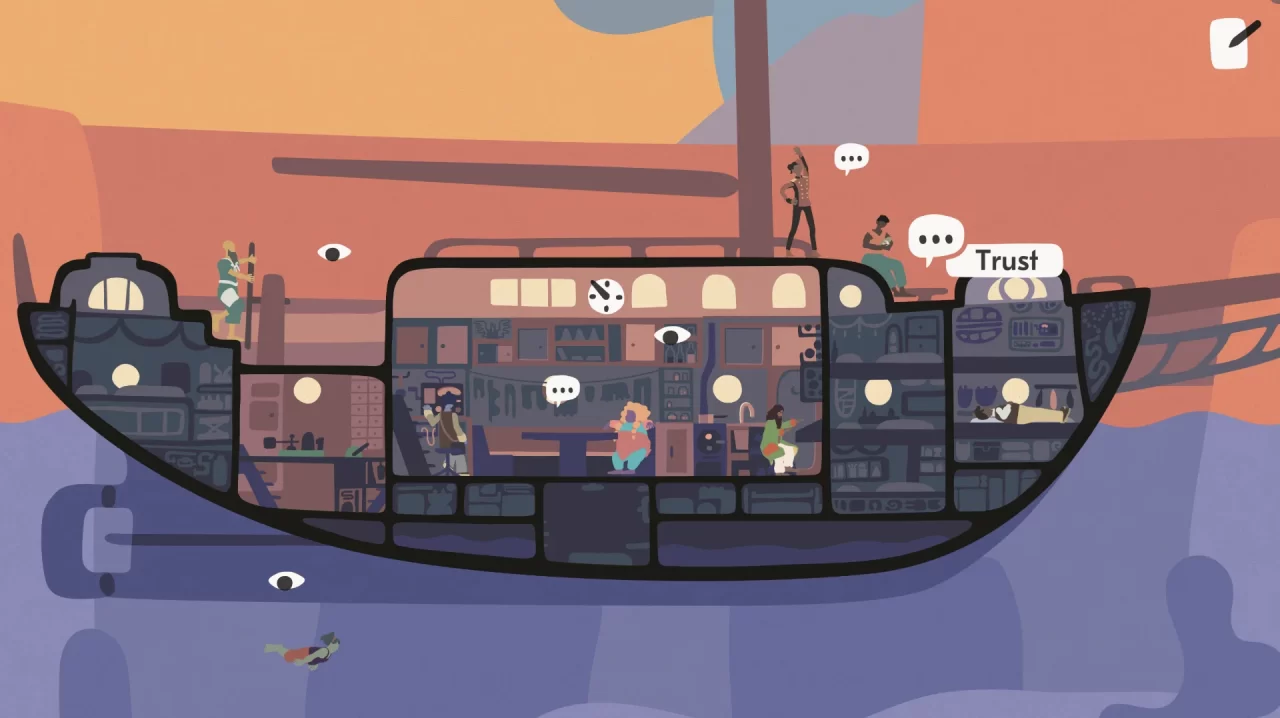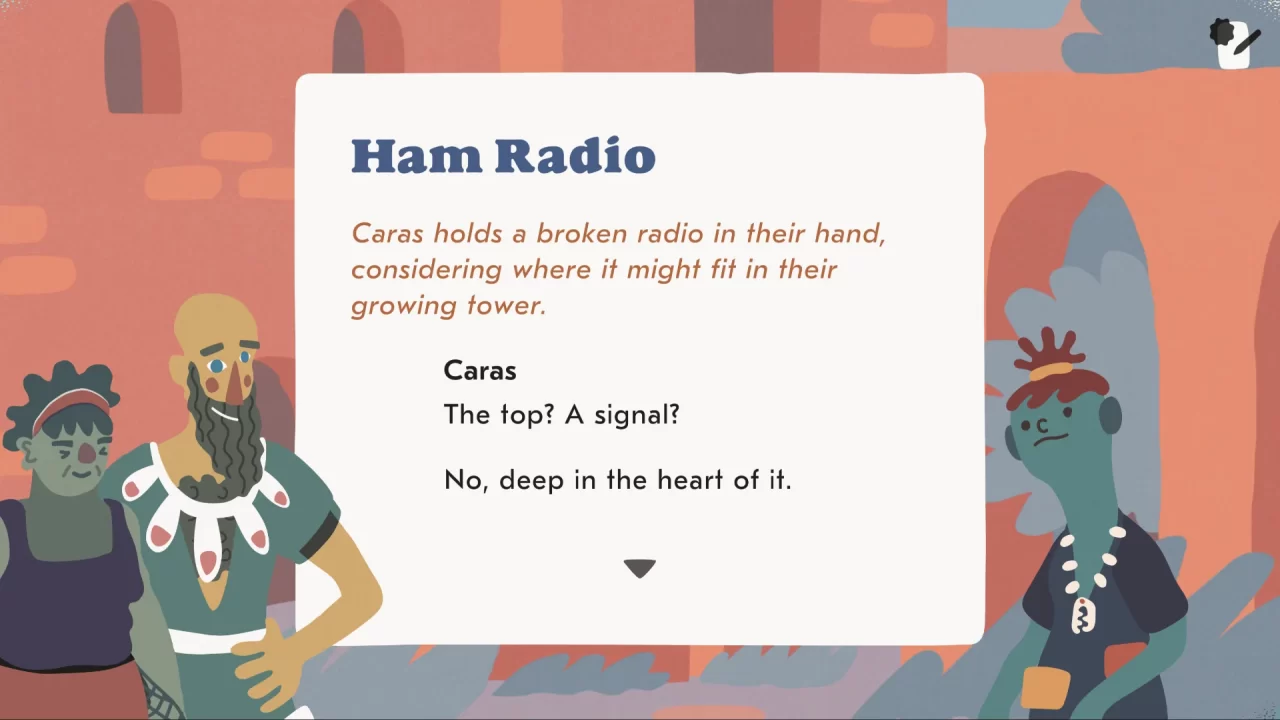Unique premises in video games have become increasingly rare as the years go by, so when one comes around, I jump een it (in this case, in the form of diving). Saltsea Chronicles is the tale of a world of harmonious diversity in which queer and multiracial people alike live hand-in-hand. All it took was a massive flood to wipe out most of the world and its technology. So, if that’s what you’re asking Santa for this Christmas, you know the price. Some may be okay with that. Question is, can the premise alone carry the story?
Meet Maja, our noble captain of a small ship on a slightly larger island. The world is an amalgamation of relics of the distant, pre-Flood past and spiritual fortune telling (dreamsailing). Maja treats her modest crew with stories aplenty out of the gate, and then goes missing. Distressed and eager to save their possibly captured captain, the crew must find a way to chase after her. Where their journey leads them is the core of this story.

Like any competent tale, our crew learns lessons, bonds, argues, and discovers life is much bigger than they had once thought. The skeletal structure of the plot is intact, but what about the delivery? Most of Saltsea Chronicles is told by clicking nodes on a zoomed-out, two-dimensional map that can be traveled across from side to side by clicking the edge of the screen or clicking doors to go inside a dwelling. Most nodes lead to screen change in which two or more characters carry on back and forth, with players occasionally making a binary decision. Most of the time, the dialogue choice is a light descriptor of what a character may say, though the resulting dialogue may not match the player’s intent, as was the case with me. Regardless, I found the exchanges engaging—to a degree.
To call Saltsea Chronicles verbose would be an understatement. As far as word choice, sophistication of language, and cultural sensitivity are concerned, Saltsea Chronicles leads the pack. I wouldn’t say it reaches Disco Elysium at all—who does?—but I would say it’s above average in the aforementioned traits. Problem is, it drags. Big time. I adore much of what has been done here: traveling from island to island, meeting strange people who embody an invented culture, and learning about how people survive and truly live in this post-Flood era is a joy to behold, but only to a point. What holds Saltsea Chronicles back most is that it goes on and on without going anywhere.
Sociologists and anthropologists will love this game. If you’re fascinated by how different civilizations throughout history lived their lives, used superstition or spirituality to explain that which couldn’t be explained, and survived harsh conditions, Saltsea Chronicles is for you. I spent over fourteen hours trying to get somewhere, but feel like I spent more than half of that time with dead sails.
Most of Saltsea Chronicles’ characters are inoffensive, introspective, and soul-searching. I kinda feel like I was playing a world created by the developers of Coffee Talk, another popular game I bounced off of pretty hard. For some, this is the highest praise, and that’s what I’m here to do: don’t let my criticisms guide your decision making, let the storytelling devices and character arcs I’m hinting at drive your purchase.
Saltsea Chronicles lacks punch, which is odd for a post-apocalyptic world about discovery. Don’t expect heavy-hitting themes or bold revelations. This is a meandering tale of tepid water and calm seas. Please don’t get me wrong: conflict exists, characters quarrel, and buried truths uncover themselves, but expect it all delivered in respectful, healthy fashion, even if you choose a negative option.
I stirred the pot quite a bit in my run, just to see if I could get the characters to engage in some turbulence, but it never happened. In fact, when I reached my ending and the game encouraged me to replay chapters to discover new routes, I found several of the dialogue options resulted in one or two new lines, and the rest of the conversation carried on identically to the previous run. Odd, since replayability is one of the selling points of Saltsea Chronicles, and I honestly couldn’t bear to read the exact same exhaustive dialogue over and over again. To make matters worse, speeding through dialogue on a replay is slow and cumbersome.
Not only that, but the dialogue boxes can be finicky, as sometimes just clicking the box scrolls it up or results in accidentally selecting an option. Also, the dialogue sometimes ends abruptly when it appears that it would continue. With no ability to read the conversation history, I found that I had to tediously slow myself down for fear I would miss something.
Artistically, Saltsea Chronicles’ style is assuredly unique, falling somewhere between watercolor and construction paper cutouts. Color choices lean on pastels, faded dark colors, and browns. I wouldn’t describe the style or color selection as attractive, but it certainly grabs one’s attention in that it stands out. The music, complementary to the writing and visual style, is tame, atmospheric, and chill; yet, the volume even at max settings was so low as to be indiscernible at times, as if we weren’t meant to hear it. I enjoyed the style, but with it involuntarily falling into the background, I couldn’t give it the active attention it deserved. An unusual complaint I don’t think I’ve ever had to commit.
Saltsea Chronicles was a bizarre experience for me. I admired the quality of the writing, maturity in language, and world the developers sought to craft, but I was frequently bored and eager for something to happen. I couldn’t even call this game slice-of-life, which one could argue is a genre where nothing ever happens by definition, but at least slice-of-life stories are poignant and heartfelt. Saltsea Chronicles just felt flat to me, but I am certain this game will hit some beautiful notes for folks who are tired of melodrama and intensity.




